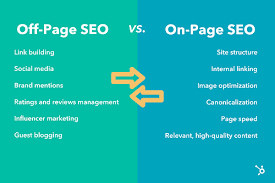
When it comes to improving your website’s visibility and ranking on search engines, on-page SEO plays a crucial role. By focusing on optimising various elements directly on your web pages, you can enhance your site’s relevance, authority, and user experience. Let’s delve into the key aspects of on-page SEO and how they can propel your website to new heights.
Meta tags, including meta titles and meta descriptions, are essential for conveying the purpose and content of your web pages to search engines and users. By incorporating relevant keywords naturally into these tags while maintaining readability, you can improve click-through rates and search engine visibility.
Content is king in the world of SEO. By producing engaging, informative, and original content that resonates with your target audience, you can establish authority in your industry and attract organic traffic. Incorporating relevant keywords strategically within your content can further boost its visibility in search results.
Well-structured headings (H1-H6) not only enhance readability but also help search engines understand the hierarchy and context of your content. By using descriptive headings that include relevant keywords, you can improve both user experience and SEO performance.
In today’s fast-paced digital landscape, page load speed is a critical factor for both user experience and search engine rankings. Optimise images, minimise code bloat, leverage browser caching, and utilise content delivery networks (CDNs) to ensure swift loading times that keep users engaged.
With the increasing prevalence of mobile devices, having a responsive design that adapts seamlessly to various screen sizes is paramount. Mobile-friendly websites not only provide a better user experience but also receive a ranking boost from search engines like Google that prioritise mobile-first indexing.
Internal links are valuable for guiding users through your website while distributing link equity across different pages. By creating a logical internal linking structure that connects related content within your site, you can improve navigation, increase dwell time, and strengthen the overall authority of your website.
Schema markup is a powerful tool that helps search engines better understand the context of your content. By implementing structured data markup on your web pages, you can enhance rich snippets in search results, increase click-through rates, and provide more relevant information to users.
By focusing on these fundamental aspects of on-page SEO and continuously refining your strategies based on data-driven insights and best practices, you can position your website for sustained success in the competitive digital landscape. Take control of your online presence today with effective on-page optimisation techniques that drive results.